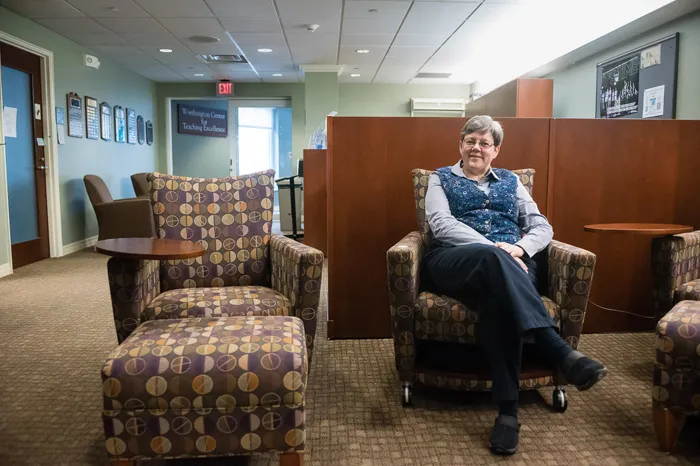
Dr. Debbie Egolf will begin her 30th year at Marietta College on Aug. 1, and with it will come new responsibilities and many more challenges.
And she couldn’t be more pleased. Egolf will become the Director of the Worthington Center for Teaching Excellence (WCTE) one month shy of her anniversary date on July 1. She is the fourth faculty member to hold this honor since the Center opened in 2009.
“Until now my role at Marietta College has been as an educator in chemistry,” she said. “I see my role in this new position as both educator and administrator, or perhaps more accurately encapsulated as a facilitator. Next year will be my 30th year at Marietta College, a milestone that I will mark with this new challenge, to reach beyond my comfort level and ‘blaze a new trail.’ ”
WCTE serves the Marietta College community by promoting effective teaching, engaged learning and innovative pedagogy. Egolf has sought out advice from past directors and is working closely with the current director, Dr. Tanya Judd Pucella.
“Fortunately for me, Tanya is working with me to make this a smooth transition between directors,” Egolf said. “She has already provided me with sage advice and voluminous resource files. I look forward to working with (Instructional Technologist) Linda Roesch and the Worthington Advisory Group to design and execute programs. I anticipate the many opportunities over the next three years to engage with and learn from my Marietta College colleagues and outside educators.”
Dr. Janet Bland, Provost and Dean of the Faculty, said she is excited to welcome Egolf to the Worthington Center for Teaching Excellence.
“An experienced teacher and senior faculty member, Debbie was deeply involved in the new General Education curriculum approved by the faculty this spring,” Bland said. “An ambitious curriculum like this requires ambitious support and programming to deliver it to our students. As the Director of the WCTE, Debbie is the ideal person to spearhead efforts to support faculty as they develop new courses, new minors, and consider new methods of teaching.”
That experience on the General Education Task Force, and now as chair of the Curriculum Committee, is why the timing of placing Egolf in this new position is vital.
“My primary goal in this position is to design programming to help us create a robust, integrated Core curriculum,” Egolf said. “Addressing questions such as ‘What is an Integrative Core?’ and ‘How can concepts or skills be introduced and reinforced throughout the Core?’ will be a good start. Offering workshops for developing the Core courses and designing interdisciplinary minors will be critical steps in the implementation of the curriculum.”
Egolf said another essential piece is working with faculty advisors and other student mentors — coaches, professional staff, etc. — to provide effective student advising on the curriculum.
“Both (Associate Provost) Suzanne Walker and (Associate Professor) Nicole Livengood have indicated a need for programming for ‘non-faculty’ educators, and especially programming that encourages collaboration between faculty and professional staff,” Egolf said. “Thus, with their help, I plan to address this need. The advising workshop could be an important first step.”
Judd Pucella provided Egolf with some existing programs that she believes are beneficial to maintain.
“The Teaching Tools approach we have been using this year seems to work well. These quick drop-in opportunities to talk about teaching and learning with our colleagues seem to give faculty an opportunity to sample a broad array of professional development experiences,” Judd Pucella said. “Linda (Roesch) and I felt like the Course Re-Design Institute went very well to start the spring semester and plan to offer another round later this spring. The Learning Communities have had variable success depending on the topic.”
Egolf is planning to keep them.
“I also plan to work with the Worthington Advisory Group to continue to offer the January and May workshops,” she said. “Another critical function of the Center is to provide new faculty orientation, which will be continued using the excellent activities and materials developed over the years.”